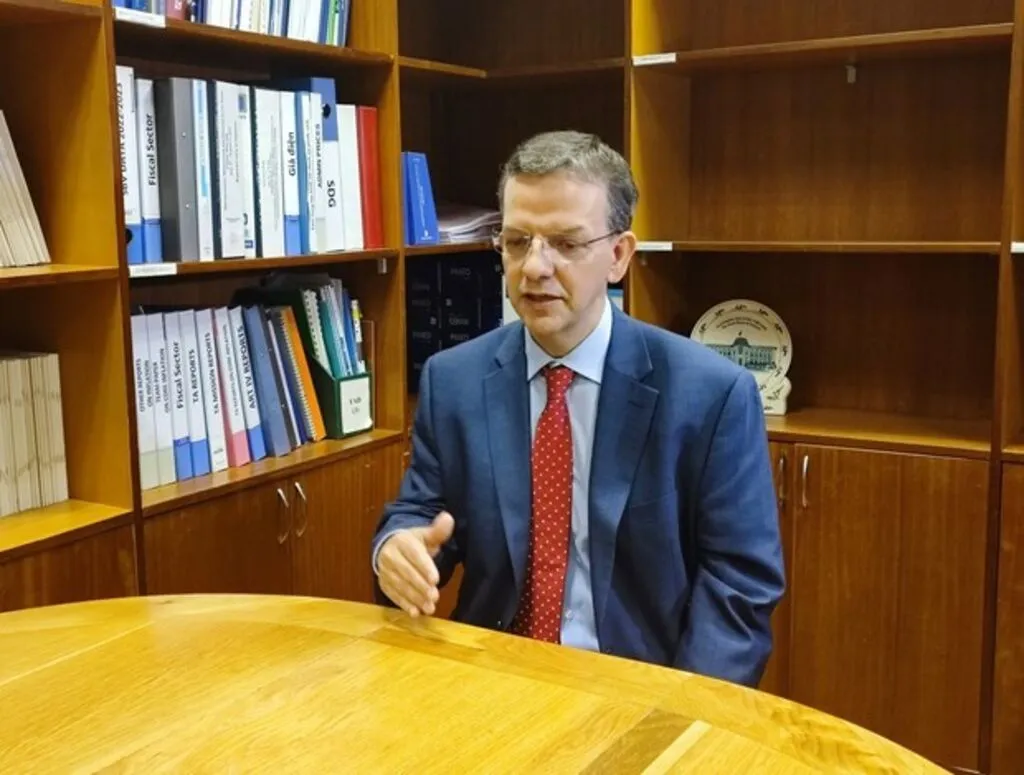 Talking Shop
Talking Shop

 |
| Division Chief of the International Monetary Fund (IMF)’s Fiscal Affairs Department Paulo Medas. |
An International Monetary Fund (IMF) team led by Paulo Medas conducted discussions with Việt Nam from June 14-29 regarding macroeconomic policies and the finance and banking sectors.
Experts from the IMF's mission highly appreciated the resilience of the Vietnamese economy and called for better policy coordination to stabilise the macro-economy at present.
Paulo Medas spoke to Vietnam News Agency about these issues.
What is your evaluation of Việt Nam's economy so far this year and its prospects for the remainder of the year?
Việt Nam, like other countries in the world, is facing a difficult external environment. Global growth is low while global interest rates are high. Many open economies, including Việt Nam, are struggling.
Việt Nam's exports fell by 12% in the first half of the year, which hurts growth. The fact that global interest rates are high also makes it more difficult for businesses in general, and this is creating instability in the global financial market.
Still, Asia and Việt Nam are doing much better than the rest of the world, which is in a difficult situation.
After the deceleration in economic growth in the first half of the year in Việt Nam, we expect the rebound in the second half to be pushed by a recovery in exports and policy support. The SBV cut interest rates, which is going to help.
We think fiscal policy can also help by increasing spending and cutting taxes.. We think for the rest of the year, Việt Nam's GDP growth should reach around 4.7%, with the recovery continuing into 2024. We expect the growth to be around 5.8 to 6% in 2024.
It's slower than 2022. But it's much higher than global growth. Việt Nam is still doing better than most countries.
What are challenges and advantages that Việt Nam faces in 2023, both internally and externally?
From the external side, as I mentioned, the problem is weak global demand, which has led to weak exports in the first half of the year. We expect some recovery in the second half, but they are going to still continue to be weaker than before. That's going to reduce growth.
Internally, the problems in the real estate sector and the corporate bond market are also hurting growth. That's also going to reduce growth in this year.
On the positive side, the Government and SBV have taken actions which we hope will increase domestic demand.
We expect global growth to only start to really recover in 2025.
Regarding the banking sector, what is your evaluation of the policies implemented by SBV in recent years, particularly in terms of monetary policy and exchange rates?
The banking system facing a difficult period because of the rise in interest rates around the world and low economic growth. Some banks were also hit hard during the COVID-19 pandemic.
Governments need to strengthen banks by increasing capital, having policies to manage non-performing loans, and increasing liquidity. In Việt Nam, the loans to deposit ratio is quite high. So, that's going to constrain credit growth. You need to make sure that the banks are strong and healthy, so they can increase credit growth in the future.
I think the SBV, like other central banks in the world, have been learning problems in banks can emerge very quickly, like in the United States and Switzerland, and you had a problem with SCB last year.
We have advised the Government that it's important to strengthen the tools to supervise the banks more closely and have the tools to quickly act if there's other problems with banks in the future.
Right now, the National Assembly is revising the law on credit institutions. We think this is a great opportunity to improve the law so that the SBV and the Ministry of Finance have the tools to act quickly. If you have healthy banks, then they can increase credit. They will also increase the potential for effective monetary policy. For example, the SBV from early in the year has cut rates to very close to record low rate. But the effectiveness of impacts on credit are limited because the banks need to fix some of their problems.
What do you think about the ongoing banking sector restructuring programme?
As I mentioned, you need better tools to supervise the banks more closely to have early interventions. So that if they start to detect problems, they can move faster, and you need the tools to manage problems when they emerge, like the problem with SCB last year. That bank had to be put under control by the SBV, which managed to effectively stabilise the situation.
But the process in Việt Nam is very long, it's very complex. We need more forms, like changing the law on credit institutions to make the process faster. I think if you do that, you're going to have healthier banks in the future.
What are your recommendations for the Vietnamese government and policymakers to effectively manage the macroeconomy in the future?
I think in the short term, it is to ensure macro financial stability, given the very difficult environment in the world.
What that means in our view, is that fiscal policy can take on a bigger role to support the economy. You don't use more monetary policy, because it has already been used a lot. There are still risks from the external side of the foreign exchange market. The focus should be on fiscal policy to help growth right now.
The other two things that the Government can do right now is to fix the real estate and corporate bond market issues. If you can fix those problems, it's going to help the economy grow.
And third, it is to strengthen the ability of the SBV and the Ministry of Finance to act quickly if there's any problem in the banks. That also increases financial stability. All this is going to help growth now and in the future.
And then I would say there are a set of reforms that the Government can do to achieve their medium- and long-term economic goals.
I know the Government wants Việt Nam to become an advanced economy by 2045. This is ambitious, but it can be done with the right reforms to promote growth, and at the same time, achieve the climate goals to achieve net zero emissions by 2050.
These are very ambitious goals, but they can be achieved with reforms. I think there are three big things. One thing is to improve the business environment so you make the law simpler and reduce red tape. This will attract more FDI.
Việt Nam needs to build critical infrastructure in the energy sector and elsewhere as per announced plans. This will ensure energy security and renewable energy over the next five to 10 years.
The next thing is to invest in education and technology. That's the future. You have a big young population. Việt Nam should build education and technology that will increase productivity and growth in the future. That's really important.
The other thing I would also mention is that Việt Nam needs very large infrastructure and social improvements to achieve advanced economy status, which requires more revenue. So, if you can increase revenue, this can be used to build better infrastructure and address the social needs such as education, health, and social welfare. All these will help you move towards the goal of achieving the status of an advanced economy. VNS




